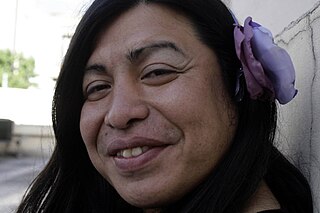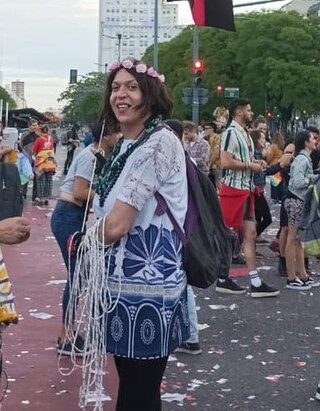Related Research Articles
Same-sex marriage has been legal in Argentina since July 22, 2010. Bills to legalize same-sex marriage were introduced to the National Congress in 2009 by deputies from the Socialist and New Encounter parties. Following much discussion, a unified bill passed the Chamber of Deputies on May 5, 2010 by a vote of 126 to 110, and the Senate on July 15 by 33 votes to 27. President Cristina Fernández de Kirchner signed the bill into law on July 21, and it went into effect the following day. Polling indicates that a majority of Argentines support the legal recognition of same-sex marriage. Argentina was the first country in South America and Latin America, the second in the Americas, the second in the Hispanic world, the second in the Southern Hemisphere and the tenth in the world to legalize same-sex marriage.

Lesbian, gay, bisexual, and transgender (LGBT) rights in Argentina rank among the highest in the world. Upon legalising same-sex marriage on 15 July 2010, Argentina became the first country in Latin America, the second in the Americas, and the tenth in the world to do so. Following Argentina's transition to a democracy in 1983, its laws have become more inclusive and accepting of LGBT people, as has public opinion.

The term travesti is used in Latin America to designate people who were assigned male at birth and develop a feminine gender identity. Other terms have been invented and are used in South America in an attempt to further distinguish it from cross-dressing, drag, and pathologizing connotations. In Spain, the term was used in a similar way during the Franco era, but it was replaced with the advent of the medical model of transsexuality in the late 1980s and early 1990s, in order to rule out negative stereotypes. The arrival of these concepts occurred later in Latin America than in Europe, so the concept of travesti lasted, with various connotations.
The Guadalajara Pride is an event that celebrates diversity in general and seeks equal rights for LGBT people, is celebrated in the city of Guadalajara, Mexico.
The history of lesbian, gay, bisexual and transgender people (LGBT) in Argentina is shaped by the historic characterisation of non-heterosexuality as a public enemy: when power was exercised by the Catholic Church, it was regarded as a sin; during the late 19th and early 20th centuries, when it was in the hands of positivist thought, it was viewed as a disease; and later, with the advent of civil society, it became a crime.

Ilse Fusková Kornreich was an Argentine activist, lesbian-feminist, and journalist.

Transgender and travesti rights in Argentina have been lauded by many as some of the world's most progressive. The country "has one of the world's most comprehensive transgender rights laws": its Gender Identity Law, passed in 2012, made Argentina the "only country that allows people to change their gender identities without facing barriers such as hormone therapy, surgery or psychiatric diagnosis that labels them as having an abnormality". In 2015, the World Health Organization cited Argentina as an exemplary country for providing transgender rights. Leading transgender activists include Lohana Berkins, Diana Sacayán, Mariela Muñoz, María Belén Correa, Marlene Wayar, Claudia Pía Baudracco, Susy Shock and Lara Bertolini.

Amancay Diana Sacayán was an Argentinian LGBT and human rights activist who fought for the legal rights of transvestites and transgender people in Argentina.

LGBT in Argentina refers to the diversity of practices, militancies and cultural assessments on sexual diversity that were historically deployed in the territory that is currently the Argentine Republic. It is particularly difficult to find information on the incidence of homosexuality in societies from Hispanic America as a result of the anti-homosexual taboo derived from Christian morality, so most of the historical sources of its existence are found in acts of repression and punishment. One of the main conflicts encountered by LGBT history researchers is the use of modern concepts that were non-existent to people from the past, such as "homosexual", "transgender" and "travesti", falling into an anachronism. Non-heterosexuality was historically characterized as a public enemy: when power was exercised by the Catholic Church, it was regarded as a sin; during the late 19th and early 20th centuries, when it was in the hands of positivist thought, it was viewed as a disease; and later, with the advent of civil society, it became a crime.

Lohana Berkins was an Argentine travesti activist.

Marlene Wayar is an Argentine social psychologist, travesti-transgender activist, and author of the book Travesti: una teoría lo suficientemente buena.

Claudia Pía Baudracco was an Argentine activist for the rights of women, sexual minorities, and LGBT people.
The Gender Identity Law, Argentina's law number 26,743, allows transgender people to be treated according to their gender identity and have their personal documents registered with the corresponding name and gender. In addition, it orders that all medical treatments for transitioning be included in the Compulsory Medical Program, which guarantees coverage by practices throughout the health system, both public and private. Approved by the Senate on 9 May 2012 and promulgated on 24 May, it has been lauded by the United Nations as a pioneering step for transgender rights in the region.

Elizabeth Gómez Alcorta is an Argentine lawyer, professor and politician. She was the first Minister of Women, Genders and Diversity of Argentina, serving under President Alberto Fernández from 10 December 2019 to 7 October 2022.
Carlos Jáuregui was an Argentine LGBT rights activist. He founded La Comunidad Homosexual Argentina in 1984. In the early 1990s, he set up Gays por los Derechos Civiles and organised the first Pride march in Buenos Aires. He died from an HIV-AIDS-related illness at the age of 38. In memorial, a national day of activism for sexual diversity was established. He was posthumously given the Felipa de Souza Award, and, in 2017, a station was renamed after him on the Buenos Aires Underground.

The March of LGBT Pride is an annual pride parade in Buenos Aires, Argentina. The march promotes the equality and rights of LGBT people. It takes place in November in memory of the creation of the first Argentine and Latin American LGBT organization, Nuestro Mundo, in November 1967.

Cris Miró was an Argentine entertainer and media personality who had a brief but influential career as a top-billing vedette in Buenos Aires' revue theatre scene during the mid-to-late 1990s. Miró began her acting career in the early 1990s in fringe theatre plays and later rose to fame as a vedette at the Teatro Maipo in 1995. For years, she hid her HIV positive status from the press until her death on 1 June 1999, due to AIDS-related lymphoma.

Alba Rueda is an Argentine politician who became the first openly transgender politician in Argentina to hold a senior governmental position when she served as the Undersecretary of Diversity Policies within the Ministry of Women, Genders and Diversity between January 2020 and May 2022.

Lara María Bertolini is an activist, researcher, and author of the book Soberanía Travesti, una Identidad argentinatransl. Travesti Sovereignty, an Argentinian Identity. She holds a position with the Public Ministry of Argentina and is a law student at the National University of Avellaneda. She won a historical case in Argentina that changed her birth certificate and I.D. to signify her identity with "travesti femininity".
The Law to Promote Access to Formal Employment for Travestis, and Transsexual and Transgender People "Diana Sacayán – Lohana Berkins", identified as the Law 27,636, is a law in Argentina that establishes that the national public sector must reserve at least 1% of its positions and vacancies for trans people, and encourages the private sector to take similar measures. It was passed by the Argentine Senate on 24 June 2021, and enacted on 8 July 2021, during the government of Alberto Fernández. The law is named after trans activists Diana Sacayán and Lohana Berkins.
References
- ↑ "Travesti". AcademiaLab (in Spanish). Retrieved 9 October 2023.
- 1 2 3 4 Butierrez, Marce (19 April 2021). "Mujer se nace: Karina Urbina y el activismo transexual de los años 90". Moléculas Malucas (in Spanish). Retrieved 9 October 2023.
- ↑ Blanco, Fernando A.; Pecheny, Mario; Pierce, Joseph M. (2018). Políticas del amor: derechos sexuales y escrituras disidentes en el Cono Sur (in Spanish). Santiago: Editorial Cuatro Propio. ISBN 9789563960020 . Retrieved 9 October 2023.
- 1 2 3 Izquierdo, Eugenia (2022). Mujeres: luchas y conquistas (in Spanish). Buenos Aires: Tercero en discordia. ISBN 978-9878971384.
- 1 2 Butiérrez, Marce (5 November 2021). "Marcha del Orgullo 2021: No venimos de un repollo". Página 12 (in Spanish). Retrieved 9 October 2023.
- ↑ Fernández, Josefina (2020). La Berkins: una combatiente de frontera (in Spanish). Buenos Aires: Sudamericana. ISBN 978-9500763974 . Retrieved 9 October 2023.
- 1 2 Amabile, Marina (22 September 2022). "El día que esté aburrido". El Gato y La Caja (in Spanish). Retrieved 9 October 2023.
- ↑ Bazán, Osvaldo (2019). Historia de la homosexualidad en la Argentina (in Spanish) (4th ed.). Buenos Aires: Marea Editorial. ISBN 978-9873783289.
- ↑ "Las travestis y trans también hacemos este país grandioso y soberano". Cosecha Roja (in Spanish). 11 June 2021. Retrieved 10 October 2023.
- ↑ Amarillo, Ignacio Andrés (26 November 2021). "Ilse Fuskova: Un viaje de vida". El Litoral (in Spanish). Retrieved 10 October 2023.
- ↑ Bellucci, Mabel (7 November 2015). "Primer informe sobre la comunidad travesti en Buenos Aires". ANRed (in Spanish). Retrieved 10 October 2023.
- ↑ "Reconocieron a los convocantes de la primera marcha gay". Noticias Urbanas (in Spanish). 29 June 2016. Retrieved 10 October 2023.
- ↑ "Reconocerán a organizaciones que convocaron a la primera marcha del Orgullo Gay-Lésbico". Nueva Ciudad (in Spanish). 28 August 2016. Retrieved 10 October 2023.